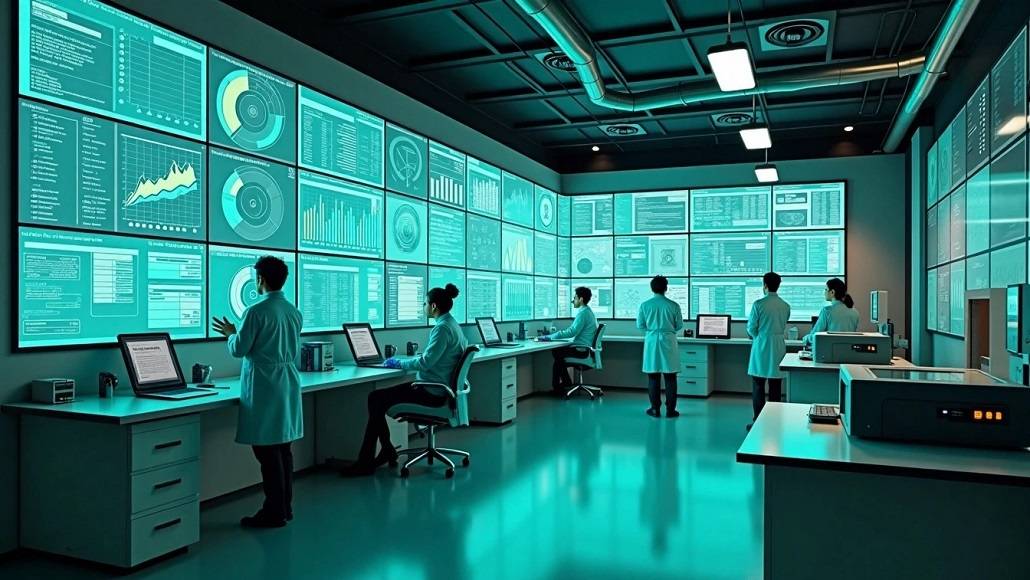The healthcare industry is in the midst of a technological revolution, and at the heart of this transformation lies the concept of smart hospitals. Created to improve operational effectiveness, streamline patient care, and reshape the healthcare experience, smart hospitals are using advanced technologies to address the challenges of contemporary medicine. From artificial intelligence (AI) to the Internet of Things (IoT), it is not a trend but a future necessity for healthcare to be integrated with cutting-edge tools.
Smart Hospitals: Redefining Healthcare Operations
Smart hospitals are a giant step ahead of the way healthcare facilities function. Smart hospitals are powered by networks of technologies that integrate functions, enhance the delivery of care, and enable both patients and caregivers. “Smart” refers to the capacity to leverage data, automation, and sophisticated systems to provide a seamless and effective healthcare setting.
The primary difference between smart and traditional hospitals is in real-time information and technology-based decisions. Smart hospitals use respective integrated systems that feed information from multiple sources and processes so that health care can be effective and allow for patient customization and improvement in care effectiveness beyond what traditional hospitals can offer. The ultimate vision of all these smart hospital technologies and innovations is reducing cost, delivering better care, and increasing accessibility.
- Enhancing Patient Care Through Technology
The most significant impact that smart hospitals will have on our health systems is a better way to provide patient-centered care. Innovation in smart hospitals utilizes cutting-edge technologies, like artificial intelligence, predictive analysis, and wearables that will forever change the paradigm of effective and evidence-based patient care.
Using AI systems is now commonplace to analyze patient data for risk, and in some cases anticipate serious health challenges before they happen. AI allows interventions earlier, avoiding significant complications and better outcomes. The AI systems can be used to manage vital statistics and trend analysis, identifying deviations that could be the beginning of a serious health episode. Predictive medicine has not only saved lives, but it has optimized our resources in health services as well.
Wearable technology is also becoming increasingly important in smart hospitals. These wearables monitor patients’ vitals around the clock, giving real-time information that is automatically integrated into electronic health records (EHRs). With this continuous monitoring, healthcare professionals can track a patient’s progress and use the data to make treatment plan decisions. Wearable technology also allows patients to be more involved in their care, which ultimately leads to better adherence to treatment plans.
Another area where intelligent hospitals are pivotal is personalization. Through the examination of a patient’s genetic data, clinical history, and lifestyle factors, medical professionals can develop personalized treatment programs that respond to the unique requirements of each individual. This kind of care promotes increased patient satisfaction and improves clinical outcomes.
- Streamlining Operational Efficiency
Efficiency is the foundation of intelligent hospital design. With resources in health care generally limited, maximizing operations is critical to delivering high-quality care. Intelligent hospitals do this through automation, data analysis, and resource management systems.
Automation is at the core of operations in smart hospitals. Processes that were once manual, including scheduling appointments, inventory management, and billing processing, are now automated. This eliminates administrative tasks from employees and decreases the potential for errors. For example, automated scheduling systems are able to forecast patient flow and assign resources to match, thus ensuring that the hospital runs smoothly even during high-demand hours.
Data analytics is critical to maximize operational efficiency. By analyzing patterns in patient admissions, resource usage, and staff activities, administrators can make informed, data-driven decisions that optimize workflows. Predictive analytics, for example, can help them anticipate demand for hospital beds or surgical equipment, both of which can improve planning and resource allocation.
Another key component of operational efficiency is the management of energy and facilities. Intelligent hospitals use IoT-enabled equipment to measure and improve energy use. Whether it relates to lighting or heating, ventilation, and air conditioning systems, or concerns medical devices, smart hospitals transforming healthcare by using technology to use resources more efficiently, lowering costs and environmental impact.
Smart hospitals aren’t only about technology; they’re about providing healthcare workers with the means to do their jobs even better. Through the availability of sophisticated tools and real-time information, such hospitals empower clinicians to make more informed decisions and concentrate on what really matters — care for the patients.
One of the means through which smart hospitals assist health workers is by decision-support systems. The decision-support systems look at huge sets of data and offer evidence-based suggestions, assisting clinicians in making the best decision. For instance, a decision-support system powered by AI may advise on the best course of treatment for a patient according to his/her history and present condition. This confers less mental strain on healthcare professionals and guarantees better care for patients.
- Supporting Healthcare Professionals
Smart hospitals also facilitate teamwork among healthcare professionals. Smart hospitals use communication platforms and shared records to make coordination across departments and specialties more streamlined. For instance, a physical therapist can see the same patient information as an orthopedic surgeon, so they can collaborate on a complete treatment plan.
Smart hospitals are also focusing on the issues of burnout among staff, which is a massive problem in the healthcare industry. Automation and AI technologies are replacing mundane and time-consuming activities, leaving healthcare professionals with more time to care for patients and less work-related stress.
Addressing Challenges in Smart Hospital Implementation
Although the advantages of smart hospitals are undeniable, putting in place such systems has its own drawbacks. Healthcare professionals will face the problems of cost, interoperability, and data privacy before they can fully realize the benefits of smart hospitals.
One of the largest challenges of developing smart hospitals is the initial cost of rolling out smart hospitals. The costs can add up quickly from upgrading infrastructure, to new hospital forms of training employees. However, it is important to view this as an investment in the future, and in the long run, the cost savings, operational efficiencies, and other operational savings that come with adopting smart technologies can negate the initial expense in the long run.
Interoperability is yet another essential challenge. Most healthcare systems employ different technologies that are not well integrated to communicate with each other. This can inhibit the hassle-free integration of data, which is crucial for smart hospitals transforming healthcare to operate at maximum efficiency. For this purpose, healthcare professionals and technology developers need to collaborate to define standards and protocols that facilitate interoperability.
Data protection and security are topmost issues in today’s digital world. As smart hospitals amass a great deal of patient data that is sensitive in nature, this data needs to be secured at all costs. With the proper cybersecurity protocols, no regulatory compliance issues, and properly trained staff, we can protect patient data and build a good level of trust.
The Future of Smart Hospitals
As technology advances, smart hospitals will also improve. Precision medicine, augmented reality (AR), and blockchain will be among the innovations that will define the future of healthcare operations.
Precision medicine, which involves matching treatment to a person’s genetic profile, will become more widely available due to advances in data analytics, and biotechnology. Smart hospitals will implement these technologies to provide incredibly personalized care, improving patient outcomes and lowering costs.
AR has the potential to transform medical education and surgery. By superimposing virtual data on to the physical environment, AR has the ability to offer surgeons real-time instruction during procedures. The technology will not only enhance surgical results, but also the education of future medical professionals.
Blockchain technology offers a solution to the challenges of data security and interoperability. Blockchain can store and share data in a decentralized and secure manner while ensuring that data remains private, and only available to authorized users.
Conclusion: Transforming the Future of Healthcare
Smart hospitals transforming healthcare represent a shift in how health care is delivered and managed. By incorporating contemporary technologies, these hospitals not only enhance patient outcomes but also redefine the efficiency of operations and professional collaboration. Although obstacles exist regarding cost, interoperability, and privacy of data, the advantages of smart hospitals far outweigh the hindrances.
As healthcare continues to adopt innovation, intelligent hospitals will be the key to the future of medicine. The message to providers, patients, and policymakers is clear: investment in smart hospital facilities is critical to address the needs of healthcare in the modern era and build a healthier tomorrow for everyone.


















